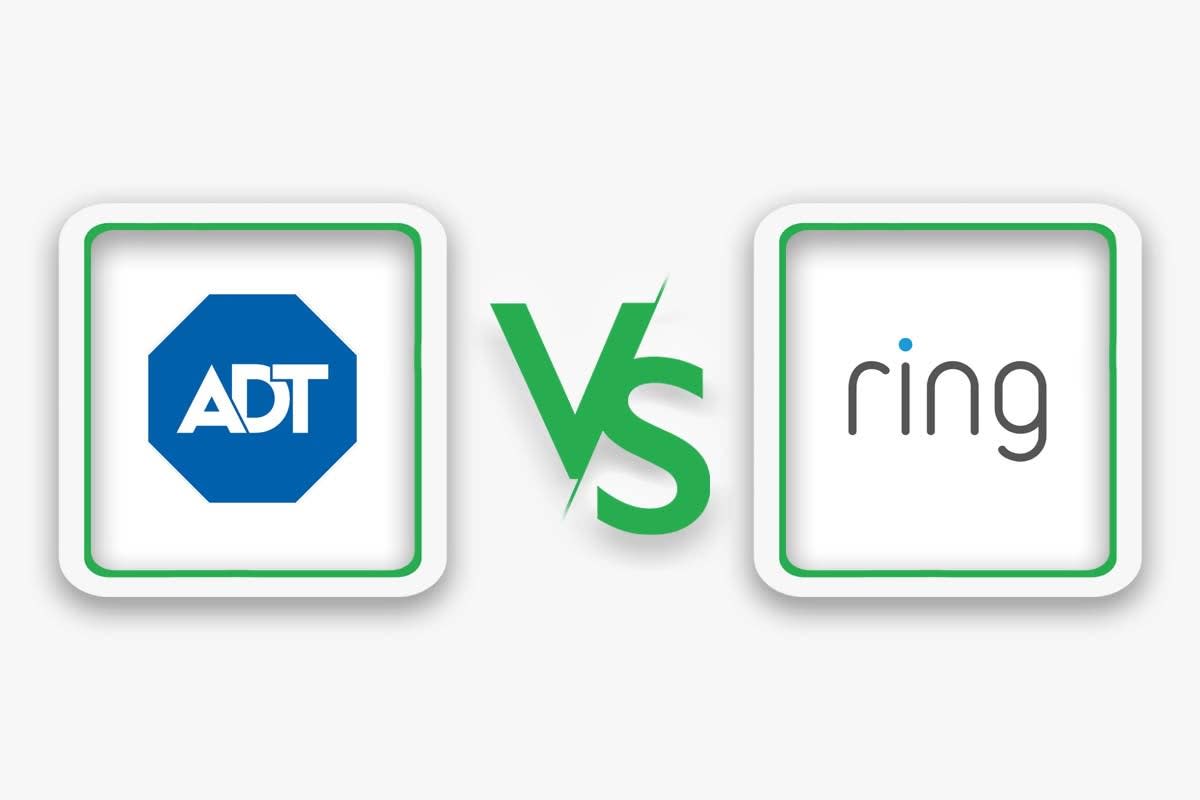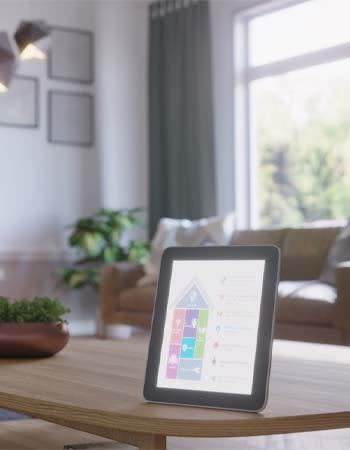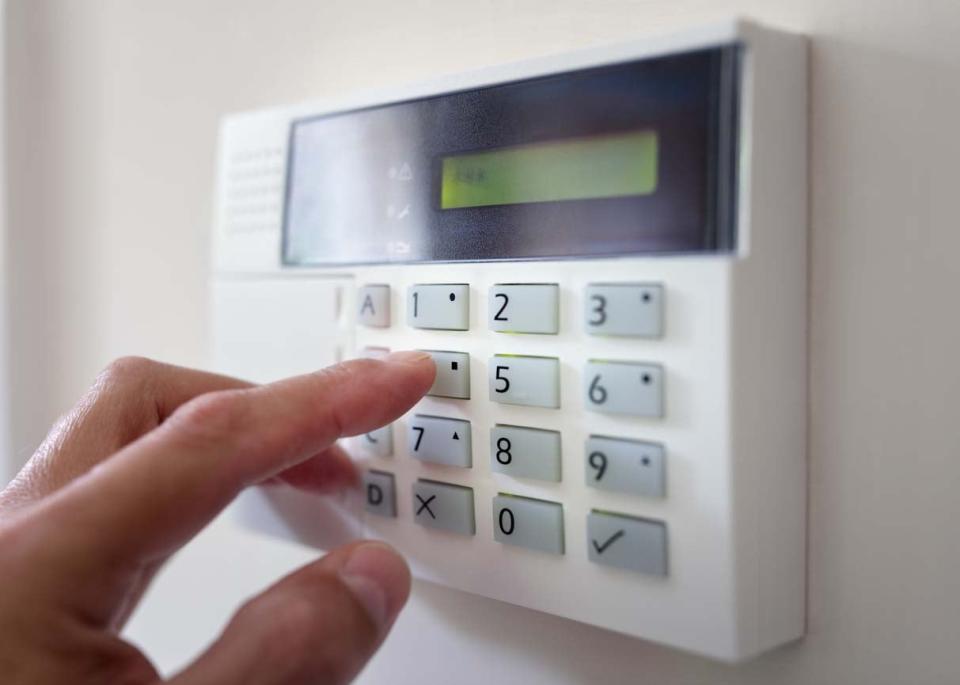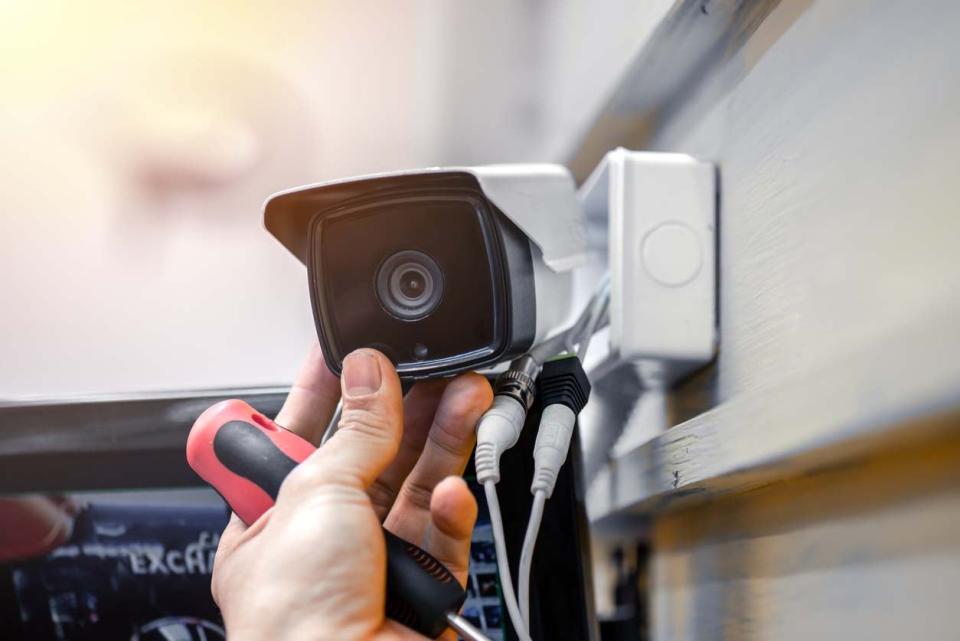ADT vs. Ring: Which Home Security System Should You Buy?

Although not all homeowners and renters choose to have a security system installed, many find home security systems worth it for the peace of mind they provide. When it comes to home security systems, Ring home security systems and ADT home security systems are among the most popular. Both have developed stellar reputations, offer top-of-the-line products, and make it easy for customers to protect their homes year-round. Because there are a lot of similarities between these two companies, it can be difficult for customers to figure out which is the better option.
Truth be told, it’s hard to go wrong with either provider—Ring and ADT are among the best home security systems in the nation. But for those looking to get the ideal coverage for their home, this comprehensive look at what each security system has to offer can help.
Editor's Note: Prices listed in this article are accurate as of the last update, but may vary. For the most up-to-date costs, please see the ADT or Ring website.
How We Compared Home Security Systems

Photo: istockphoto.com
There are a lot of different factors for customers to consider when shopping for a home security system. The following criteria were used to compare ADT and Ring and, ultimately, determine which one walked away with the home security system crown.
Reputation: Reliability matters when it comes to home security. It’s easier to sleep at night when going with a company that has reliable products and top-notch customer service as opposed to trusting a start-up with unknown standards.
Equipment options and quality: Not all companies offer the same security equipment. Before opting for a plan, it’s crucial for customers to understand which products are available.
Packages and plans: Home security packages come in all shapes and sizes. Brands with more versatility are likely to be of higher value to customers, as they’ll offer a plan for all budgets.
Pricing and fees: Beyond the cost for equipment and installation, security systems often require monthly subscriptions. If ongoing costs are too high, an otherwise stellar security plan might not be as impressive as it seems.
Installation: Equipment can be professionally installed or offered as a DIY kit, but both options aren’t always available for every available package.
Monitoring: Professional monitoring means an employee is keeping an eye out for any alerts on the property. This is a key feature that provides peace of mind to customers.
App user experience: Today’s security systems are typically powered by a smartphone app—but some are easier to use than others. Ideally, the accompanying app will make it easy to quickly activate (or disarm) the system.
Contracts and trial period: Regardless of how good a plan looks online, sometimes things go awry when brought into the real world. A trial period ensures customers can test out the system before locking in a contract.
Warranty: Security devices are designed to be reliable. But if something does go wrong, a solid warranty helps prevent additional expenses.
Home automation and device compatibility: Beyond keeping a home safe, the best security systems can interface with other devices for a multifaceted, connected network.
1. ADT vs. Ring: Reputation and Customer Reviews
ADT and Ring are about as reputable as home security companies can get. Both are well known for their lineup of reliable products, responsive customer service, and dedication to launching new products and packages to meet changing customer demands. However, Ring is relatively young compared to ADT—Ring was founded in 2013, while ADT has been around since 1874.
Just because Ring is younger than ADT doesn’t automatically mean it's less appealing, but the fact that ADT has retained such a stellar reputation for more than a century speaks for itself. ADT has a 4.6 out of 5 rating on ConsumerAffairs, while Ring’s Consumer Affairs rating is significantly lower at 1.6 out of 5. Meanwhile, on Trustpilot both ADT and Ring have earned a 1.2 and 1.3 out of 5, respectively. These reviews don’t tell the whole story, however, as it’s important to remember that customers who have a bad experience tend to be more likely to leave a review than those who don’t encounter any issues at all.
Both providers are active on social media, responding to questions from their communities, sharing home security tips for improved performance, and showing general concern for the wellbeing of customers. Both ADT and Ring alarm customer service are easy to contact and offer live chat as well as phone support.
Verdict: ADT and Ring are both well-known and highly reputed names in the home security industry. However, ADT appears to have a better reputation overall: Not only has it been in business since 1874, but customers typically have relatively more positive feedback about the company’s security services, as evidenced by an analysis of various review platforms.
Winner: ADT
2. ADT vs. Ring: Equipment Options and Quality
Ring is best known for its lineup of video doorbells, but the company also manufactures several different types of security cameras compatible with Ring doorbells, as well as floodlights, motion sensors, and comprehensive security packages. There’s even a robust selection of environmental sensors (such as a smoke and carbon monoxide detector and a flood and freeze sensor) that offer complete home protection. Products can be purchased individually or as part of a package, allowing customers to build their security system to fit their needs. The quality is also generally impressive, with doorbells and security cameras that can run for years with little to no issues.
It’s a similar story for ADT. But beyond the standard security cameras and sensors, ADT offers smart locks, smart thermostats, and numerous products from the Google Nest lineup. Google Nest devices are just as reliable as Ring products, and first-party devices from ADT are known for their longevity and reliability. Best of all, ADT and Google systems work together seamlessly, offering customers conveniences beyond just home security.
Popular products in the ADT catalog include the ADT Command touch screen, ADT door and window sensors, Google Nest Cam with floodlight, ADT smart light, ADT smoke sensor, and the Google Nest Hub Max.
Verdict: Ring and ADT both offer a wide selection of high-quality home security equipment, including cameras, entry sensors, and environmental hazard detectors. However, ADT stands out and outpaces Ring with its smart-home device offerings: ADT customers can opt for smart locks, smart lights, and a Google Nest–branded smart thermometer, among other pieces of smart-home technology.
Winner: ADT
3. ADT vs. Ring: Packages and Plans
ADT offers its equipment packages in two different formats—professionally installed packages and DIY security system packages. All told, there are four different preset packages to choose from, as well as two customizable equipment packages. This range of packages gives customers several options to choose from, allowing them to find or build a security system that fits their needs. Below is a look at all six ADT packages (including prebuilt and customizable).
The Build Your Own Package comes with a touch-screen panel, three door and window sensors, and one motion detector.
The Smart Home Package includes everything in the Build Your Own Package plus a smart door lock.
The Video & Smart Home Package is a step up from the Smart Home Package, offering everything listed above along with a Google Nest Cam and Google Nest Doorbell.
The Build Your Own Self Setup Package includes a Smart Home Hub, one door and window sensor, and access to the ADT+ app.
The Starter Package includes a Smart Home Hub, four door and window sensors, two motion sensors, access to the ADT+ app, a Google Nest Doorbell, an ADT yard sign, and an ADT window sticker.
The Premium Package is the most expensive self-setup option, offering everything in the Starter Package along with a Google Nest Hub to help power all the action.
Customers will be locked into the monthly monitoring plan associated with each package, without the option to choose a cheaper monthly subscription, so they’ll want to bear this in mind when deciding which package to choose. Information on pricing is covered in more detail in a section below.
Rather than offering different preset equipment packages, Ring gives customers the option to build their setup as they see fit. Ring also lets customers choose any monthly monitoring plan they prefer, without locking them into a certain plan based on which equipment package they’ve selected. While there are two Ring camera packages offered with preset equipment, customers will want to keep in mind there are several configurations and ways to further customize what’s included with their kit.
The Alarm Security Kit offers one window or door sensor, a motion detector, a keypad, a base station, and an alarm range extender.
The Alarm Pro Security Kit offers four window or door sensors, a motion detector, a keypad, a base station, an alarm range extender, a stick-up cam battery, an Echo Show 5, and a free 30-day trial of Ring Protect Pro.
Customers can further upgrade these packages by adding additional window and door sensors and motion sensors, as well as other equipment in the Ring lineup.
Verdict: ADT and Ring both allow customers to build their own packages, though ADT also offers four prebuilt equipment packages that provide a helpful starting point for customers to build their ideal home security system. In terms of monitoring plans, Ring offers the most flexibility by allowing customers to choose the monitoring plan that works best for them. ADT customers will need to opt for the monitoring plan based on the package they choose.
Winner: ADT

Photo: istockphoto.com
4. ADT vs. Ring: Pricing and Fees
ADT’s home security costs are relatively high between equipment fees and monthly maintenance costs. The following table shows how much each of the six equipment packages from ADT cost. Customers will want to keep in mind ADT offers the option to break these out into monthly payments for professionally installed packages.
Equipment Package | Monthly Cost | Total Cost |
Build Your Own | From $9.98 | $599 |
Smart Home | From $14.15 | $849 |
Video & Smart Home | From $23.12 | $1,387 |
Build Your Own (Self Setup) | N/A | $194.98 |
Starter | N/A | $389.96 |
Premium | N/A | $744.92 |
Monthly monitoring expenses are fixed for each of ADT’s equipment packages. Generally, the more equipment in the house, the higher the monthly subscription fee. Depending on the plan, there might also be a penalty fee for canceling before the end of the contract. Below is a look at the monthly monitoring costs for each ADT package.
Monitoring Plan | Monthly Cost |
Build Your Own | From $45.99 |
Smart Home | $49.99 |
Video & Smart Home | $61.99 |
Build Your Own (Self Setup) | $24.99 |
Starter | $34.99 |
Premium | $34.99 |
How much is a Ring subscription? In general, Ring’s prices are on the lower side when compared with ADT. Its two Security Kits are relatively affordable—although prices can come close to matching those of ADT if customers add multiple pieces of additional equipment to the base kits. Below are the base costs for Ring’s two alarm packages.
Equipment Package | Total Cost |
Alarm Security Kit | $199.99 |
Alarm Pro Security Kit | $299.99 |
It’s a similar story for the monthly fees, with the most expensive plan costing just $20 per month (although customers can save even more by paying for a yearly subscription up front). Best of all, customers are free to mix and match the above equipment packages with the below monitoring plans (unlike ADT, which locks equipment packages to specific monitoring plans).
However, customers will want to keep in mind that Ring Protect Pro is the only plan that includes professional monitoring, while the other two simply unlock additional features for the equipment (such as video history and notifications) and require the customer to self-monitor their security system. Below are the monthly and annual costs for the three different Ring monitoring plans.
Monitoring Plan | Monthly Cost | Annual Cost |
Ring Protect Basic | $3.99 | $39.99 |
Ring Protect Plus | $10 | $100 |
Ring Protect Pro | $20 | $200 |
Best of all, Ring doesn’t tack on fees for customers who want to cancel their monitoring plan. This gives customers the flexibility to test out different options and figure out which works best for their setup. Customers may wonder “Is Ring better than ADT,” and for those who want a budget-friendly security system, the answer may be yes.
Verdict: Ring’s equipment and monitoring plans are relatively affordable and can fit into a wide range of budgets. While ADT offers more equipment choices, that equipment comes at a higher price—and customers will incur a fee if they cancel ADT services before their contract ends. For the average customer interested in installing a home security system, Ring offers a better bang for the buck.
Winner: Ring
5. ADT vs. Ring: Installation
ADT primarily offers professionally installed systems. Customers can schedule a home consultation to learn more about the process, after which an expert technician will bring the equipment and install it as necessary. Security camera installation costs will depend on the type of equipment the ADT customer chooses.
The company also offers DIY packages under the Self Setup umbrella. Customers will want to keep in mind that most of the equipment included in these packages isn’t the same as what’s found in the professional install packages—although they’re still composed of reliable devices, some of which are from Google.
Ring, meanwhile, is largely designed for DIY setup, and the installation process varies widely depending on which products are selected. Most gadgets in the Alarm Security Kit and Alarm Pro Security Kit are rather straightforward to install (such as motion sensors), although additional content such as video doorbells and security cameras may require additional wiring. Customers seeking the easiest installation process will want to opt for wireless equipment, as wired equipment requires a bit more technical prowess to properly install.
Verdict: Ring home security systems are designed for DIY installation, though customers can opt for professional installation through OnTech. ADT systems are traditionally meant for professional installation, but the company also offers DIY installation with its ADT Self Setup packages (however, potential ADT customers will want to note that the ADT Self Setup package equipment isn’t the same as “traditional” ADT equipment).
Winner: Tie

Photo: istockphoto.com
6. ADT vs. Ring: Monitoring
Ring has three different monitoring plans, although only one of them offers professional monitoring. There’s also a free monitoring plan—but as a free member a customer can only view their Ring video feeds or answer doorbell notifications. The three Ring Protect monitoring plans are listed below.
The Ring Protect Basic Plan offers video recording for one Ring camera, along with digital features such as notifications and in-app arming/disarming of the alarm. No professional monitoring is included.
The Ring Protect PlusPlan offers video recording for all of a customer’s Ring devices, along with the digital features from the Basic Plan. No professional monitoring is included.
The Ring Protect Pro Plan offers all the benefits of the Protect Plus Plan, along with professional monitoring.
While Ring customers can choose any monitoring package, regardless of the equipment they have, ADT ties its monitoring plans to its equipment packages. This means a customer will pay a set monthly fee for monitoring based on the package they choose and won’t be able to switch to a different monitoring plan. But while Ring only has one option for professional monitoring, ADT provides professional monitoring for all of its equipment packages, with no option for self-monitoring. The ADT home monitoring plans are explored below.
The Build Your Own Package offers rapid intrusion detection, access to nine monitoring centers, and monitored smoke and carbon monoxide (CO) sensors.
The Smart Home Package offers everything from the above plan, plus smart device integration and an app-based control system.
The Video & Smart Home Package takes everything from the Smart Home Package and adds the option to remotely view live cameras and the ability to trigger recordings when motion is detected.
Monitoring for ADT Self Setup packages is the same no matter which package a customer chooses—though the costs will vary based on equipment. All Self Setup systems come with 24/7 professional monitoring that connects to ADT-owned monitoring centers. In an emergency, ADT will send the customer an alert and notify the authorities. Customers can also use panic and duress modes to request help from the ADT monitoring center if the alarm hasn’t been triggered.
Verdict: ADT and Ring both offer professional monitoring plans which enable customers to quickly request help in an emergency situation. ADT’s professional monitoring features will depend on the type of equipment the customer selects. Ring’s professional monitoring plans are generally less comprehensive than ADT’s. However, Ring has a self-monitoring option (while ADT does not), which could make it a better choice for customers who prefer this option.
Winner: Tie
7. ADT vs. Ring: App User Experience
Both Ring and ADT offer versatile, easy-to-use apps that allow customers to quickly check in on their property. Ring is typically run through a smartphone, and its app is supported by both iOS and Android. This app can arm or disarm the security system, check in on live video feeds, review event history, or engage in conversations using devices with two-way audio. There’s also a section that offers community updates and can provide alerts to nearby safety events.
It’s a similar story for ADT, which allows the customer to view video feeds, check alerts, or control devices from afar. Depending on which package they opt for, customers might end up using one or more apps—ADT’s suite of apps includes ADT Control, MyADT, ADT+, and SoSecure. These apps offer the following functionalities.
ADT Control allows customers to arm or disarm their system remotely, control smart lights and thermostats, and view live security camera footage.
MyADT allows customers to manage their account, view and pay their bill, run system tests, and access the help center.
ADT+ is meant for customers with Self Setup systems and allows them to arm or disarm their system remotely, control smart-home features, and view live video from their security cameras.
SoSecure is a personal safety app that allows users to share their location and access emergency help when away from home.
ADT and Ring both use apps that are simple to navigate and don’t take up much space on a smartphone. They also offer a wide degree of customization, allowing customers to set up specific alerts or deactivate certain types of notifications if desired.
Verdict: Both ADT and Ring have user-friendly apps that allow customers to control their home security system remotely. However, the ADT Control and ADT+ apps also allow users to control their smart-home devices, including lighting, door locks, and climate control, for additional security and peace of mind.
Winner: ADT
8. ADT vs. Ring: Contracts and Trial Period
ADT does not offer a trial period. It does, however, offer a 6-month, money-back guarantee if equipment breaks or is otherwise faulty. This money-back guarantee isn’t the same as a trial—customers who are unhappy with the service can’t back out of their contract. But if things aren’t working as intended, ADT will cover the bill if the equipment cannot be repaired or replaced.
ADT also requires long contracts for its professionally installed systems, with most plans requiring a 3-year commitment. Depending on the plan, breaking the contract early could result in costly fees (exact costs vary widely by plan, but customers are typically on the hook for 75 percent of the remaining contract balance). ADT lets customers cancel any time prior to installation, but following the install, the contract goes into full effect. ADT Self Setup customers are not required to sign a contract, giving them more freedom to cancel service if they decide it’s not a good fit.
Ring does a good job of providing flexibility to customers, as there are no contracts; this allows customers to cancel at any time without penalty. The lack of contracts for Ring is a big win for the service, as most professional monitoring services come with lengthy commitments.
New Ring customers also benefit from a 30-day trial of Ring Protect. After setting up the Ring Alarm Kit, owners will have the option to activate a free trial of the service. Stand-alone devices such as a Ring doorbell or camera are also eligible for the free trial. However, the trial period only applies to new accounts—anyone who already has a subscription at that particular location won’t be eligible for the free trial.
Verdict: Overall, Ring offers customers more flexibility than ADT: Ring customers have up to 30 days to return their equipment for any reason; new customers get a 30-day trial of the Ring Protect professional monitoring plan; and there is no binding contract. Conversely, ADT doesn’t have a trial period, though customers can cancel their order before installation and get their money back. Also, ADT customers are required to sign a lengthy 3-year contract.
Winner: Ring

Photo: istockphoto.com
9. ADT vs. Ring: Warranty
Ring provides a 1-year warranty for all its products. This can be further extended by opting for a Ring Protect Plus or Ring Protect Pro plan, which offers a lifetime warranty for all devices in the security system network. The lifetime warranty remains in effect for the duration of the plan, meaning customers who cancel the plan will only be left with the standard 1-year warranty.
ADT’s warranty isn’t quite as robust as Ring’s. All ADT devices include a 90-day warranty, with the option to extend coverage by subscribing to the Quality Service Plan, which costs $7/month. However, customers who don’t opt for the plan will be on their own after the standard 90-day warranty expires—which often isn’t long enough to cover technical issues that arise from prolonged use. This is especially true for customers who live in a location with extreme seasons, as 90 days isn’t long enough to let their outdoor equipment experience the heat of summer and cold of winter (and it’s hard to say how gear will react when tested by Mother Nature).
Verdict: ADT’s devices come with a 90-day warranty, though customers have the option to sign up for the Quality Service Plan at an additional monthly fee and extend the warranty indefinitely. In contrast, all Ring devices have a 1-year warranty that is extended for customers who opt for the Plus or Pro monitoring plans, giving select Ring customers greater peace of mind that their equipment is protected.
Winner: Ring
10. ADT vs. Ring: Home Automation and Device Compatibility
Ring products are designed to work with other Amazon Alexa–enabled devices. However, only first-party Ring products can be controlled using the Ring smartphone app. If a customer wants additional capabilities that allow them to use both Ring and Alexa products, they’ll need to download the Alexa app.
ADT, meanwhile, has partnered with Google for seamless integration with ADT security devices and Google smart-home devices. This allows ADT systems a wide range of compatibility, as they’ll easily sync with smart thermostats, smart locks, smart displays, and other smart-home products directly from the ADT app.
Both security systems are designed to be compatible with third-party products, and while it’s not too difficult to sync Ring security systems with Alexa, it’s hard to beat the combination of ADT and Google Home security systems. And since many of these Google smart-home devices can be purchased directly through ADT, it’s incredibly easy for a customer to automate their home when opting for an ADT security package.
Verdict: ADT partners with Google to offer a variety of Nest home automation devices and cameras that seamlessly pair with ADT home security equipment. Ring is compatible with some third-party smart-home devices but doesn’t offer the same level of integration as ADT.
Winner: ADT
Verdict: ADT comes out on top because of its wide range of high-quality equipment and comprehensive professional monitoring plans. However, Ring is still a great choice for customers looking for flexibility and a relatively affordable home security system that offers self-monitoring.
From professionally installed systems to simple DIY setups, ADT has it all. Its robust monitoring systems make it an incredibly compelling service—even if its costs are higher than Ring’s. And since ADT has partnered with Google to offer a variety of smart-home gadgets, customers can treat themselves to some of the best security and smart-home devices on the market.
However, Ring is still an excellent choice for DIY shoppers looking for a cheap alarm system that is also high quality. Its catalog is filled with cameras, motion sensors, and alarms, and its low monthly fees are certainly enticing. If professional monitoring isn’t a necessity, Ring’s self-monitoring plans are much more affordable than anything offered by ADT. Its equipment is also backed by a lengthy warranty, ensuring things work as intended for years to come. Ring is generally considered to be one of the best apartment security systems since the equipment is easy to move and doesn’t damage walls.
Ring and ADT are two of the best home security options available. It’s hard to go wrong with either option, but most shoppers will find ADT to be a more well-rounded service—and one that’s more than up to the task of protecting their home.
